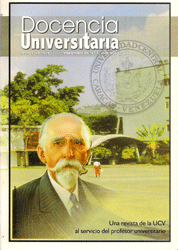Diseño de una Estrategia de Intervención Dirigida a Estudiantes de Bajo Rendimiento
Palabras clave:
bajo rendimiento académico, tareas dirigidas, educación a distancia, low academic achievement, scaffolded (directed) homework, distance educationResumen
La investigación realizada partió de la necesidad de dar respuesta al problema de bajo rendimiento académico, traducido en altos índices de reprobación y repitencia, en una de las asignaturas del componente de Psicología incluida en el pensum de la modalidad Estudios Universitarios Supervisados de la Escuela de Educación en la Universidad Central de Venezuela. Como objetivos se planteó detectar las causas que explican el bajo rendimiento en la asignatura Biopsicología y diseñar e implementar una estrategia de intervención pedagógica orientada hacia los factores derivados del diagnóstico. La estrategia se ideó sobre la base de experiencias didácticas reseñadas en la literatura, con énfasis en la teoría de modificabilidad cognitiva estructural desarrollada por Feuerstein y Reimer (1980), y se operacionalizó en la realización de tareas individuales por parte de los estudiantes, las que fueron monitoreadas a través de Internet durante un período de 14 semanas. Estas ejercitaciones permitieron combinar la enseñanza de contenidos con el entrenamiento en habilidades cognoscitivas vinculadas al área de lecto-escritura. Los resultados dan indicios para apoyar la tesis que la ejercitación continua puede contribuir sensiblemente a elevar el índice de aprobados en la asignatura, así como mejorar el rendimiento académico en la misma.
Abstract
The investigation left the necessity of responding to the problem of low academic yield, translated in high reprehension indexes and grade repetitions in subject of the psychology component included in the plan of the modality distance education from School of Education in the Central University of Venezuela. The main objectives were to detect the causes that explain the first floor yield in the subject Biopsychology, and to design and implement a strategy of pedagogic intervention guided toward the derivative factors of the diagnosis. The devised strategy was based of didactic experiences pointed out in the literature with support in the theory of structural-cognitive modifiability developed by Feuerstein and Reimer (1980). It takes place in individual student tasks, and it was conducted on the individual students’ tasks. These tasks were guided through the Internet for a period of 14 weeks. These exercises made possible for the teaching of content alongside the training in cognitive abilities to be linked o the reading-writing area. The results provided indications that would reinforce the thesis that the continuous exercises can sensibly contribute to the increase of higher scores in the subject, as well as to improve the academic output in the subject.


